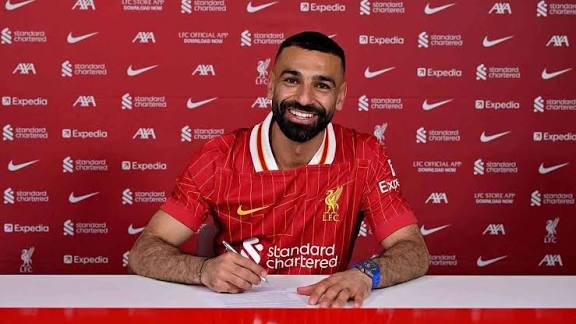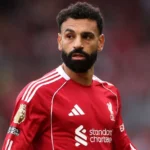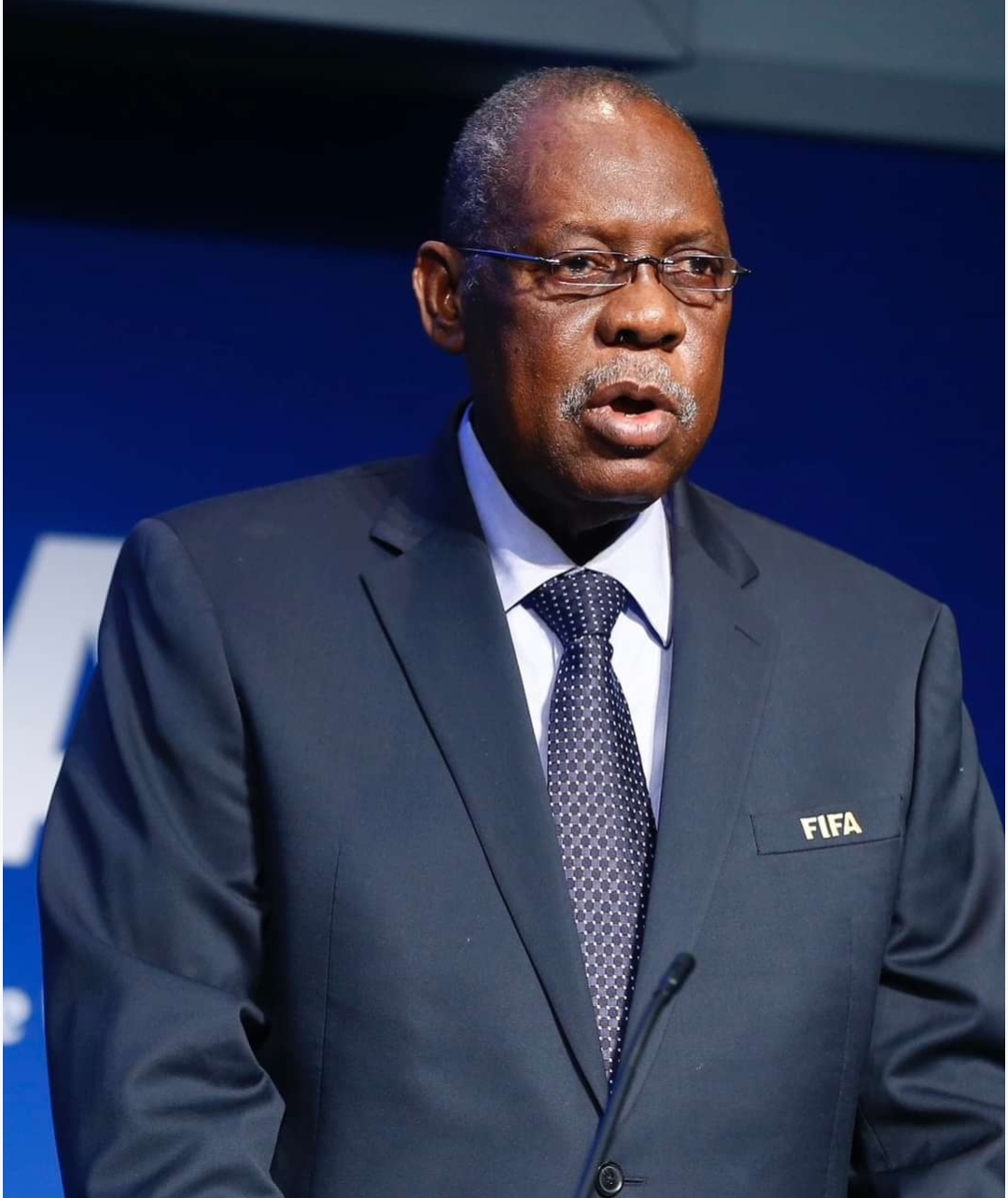Liverpool’s Mohamed Salah Makes African Football History After Emotional Comeback with Egypt

The story of Mohamed Salah is one that continues to be written in golden ink. On a humid night in Cairo, the Egyptian King once again reminded the world why he is one of Africa’s greatest-ever players. After weeks of criticism, doubts, and whispers that he might be entering the twilight of his career, Salah rose above it all — scoring twice for Egypt and breaking one of the continent’s most remarkable football records.
The 33-year-old Liverpool superstar had faced one of his most difficult starts to a season in recent memory. With just one non-penalty goal in seven Premier League matches, critics had begun to question whether Salah’s sharpness was fading. Some fans even wondered if the man who had carried Liverpool’s attack for years could still find his rhythm in Arne Slot’s new system.
But as Salah has done countless times before, he responded not with words — but with goals.
It was Egypt’s World Cup qualifier against Djibouti that reignited his flame. The Pharaohs needed a victory to confirm their qualification for next summer’s tournament, and when it mattered most, their captain delivered once again. Salah struck twice, inspiring a 3–0 victory that secured Egypt’s place at the World Cup.
For Salah, it wasn’t just a win — it was a personal redemption. And more than that, it was a historic night. With his goals, he became the all-time top scorer in African World Cup qualifying history, surpassing legends like Samuel Eto’o and Didier Drogba.
As the final whistle blew, there was a sense of nostalgia in the air. The same Cairo crowd that had cheered for Salah for over a decade watched him raise his arms in quiet triumph. His teammates ran to him, with Ibrahim Adel hugging him tightly. Cameras flashed, chants echoed, and Salah smiled — that humble smile that has become the symbol of Egyptian pride.
To many Egyptians, Salah represents far more than just a footballer. He is a national icon, a symbol of hope and perseverance. Yet, despite all his achievements, there had always been a lingering criticism — that he had never delivered a major trophy for Egypt.
Twice he came close. In 2017, the Pharaohs reached the Africa Cup of Nations final, only to lose to Cameroon. Again in 2022, they were beaten by Senegal in heartbreaking fashion, a final that saw Salah in tears. Those near misses have haunted him. But as Egypt prepares for another World Cup journey, Salah seems determined to change that narrative once and for all.
What made this particular night so special wasn’t just the record — it was what the record represented. The Confederation of African Football (CAF) confirmed that Salah had now scored 20 goals in World Cup qualifiers, more than any African player in history.
It might not sound like an enormous number compared to his club tallies, but in the context of African football, it’s monumental. World Cup qualifiers in Africa are notoriously difficult — played in extreme conditions, on challenging pitches, and often against fierce, underrated opposition. To dominate those stages for nearly a decade requires incredible consistency, mental strength, and resilience.
When CAF posted on social media — Ladies and gentlemen, please give it up to your new African #WCQ all-time top scorer 🇪🇬👑” fans across the continent celebrated. Even rival fans from Senegal, Nigeria, and Ivory Coast acknowledged the greatness of the Egyptian Ki
To understand the scale of Salah’s record, one must look at the players he overtook.
Samuel Eto’o, the Cameroonian legend, had long held the record with 18 goals in World Cup qualifying matches. Eto’o’s leadership and goal-scoring prowess helped Cameroon dominate African football in the early 2000s. His 18 goals came across 29 matches, a remarkable record in itself.
Then there was Didier Drogba, the Ivory Coast talisman whose name defined an entire era of African football. Drogba also scored 18 goals, but astonishingly, he did so in just 19 games. His efficiency in front of goal was legendary, and for years, it was believed his record would never be surpassed.
But Salah quietly climbed the ladder — match after match, campaign after campaign. His 20 goals have now come in 29 appearances, matching Eto’o’s consistency but outlasting his rivals through sheer determination and longevity.
Sadio Mané, Salah’s former Liverpool teammate and close rival, has only nine goals in World Cup qualifiers, despite being one of the most lethal forwards Africa has ever produced.
It’s poetic in a way — the two former Anfield stars once competing for the same trophies, now standing side by side in football history. But this time, it is Salah who stands alone at the summit.
For Liverpool fans, Salah’s resurgence with Egypt will come as a massive relief. His slow start to the season had raised questions about his place in Arne Slot’s new attacking system. Some pundits even speculated that the chemistry between Salah and Liverpool’s new forwards wasn’t clicking.
The criticism hit hard. At 33, Salah has nothing left to prove in England — yet football is a ruthless game where fans often have short memories. But these two goals for Egypt may have been exactly what he needed to silence the noise and rediscover his joy.
Salah has always been a player who thrives on confidence. When he smiles, when he celebrates with that familiar arm stretch, you can almost feel the energy radiate from him. That energy often carries into his Liverpool performances.
So as he returns to Anfield after the international break, fans will be hoping to see the real Mohamed Salah again — the one who glides past defenders, who scores from impossible angles, and who makes magic look routine.
There’s something deeper about Salah’s journey that goes beyond numbers. His rise from the dusty streets of Nagrig, a small Egyptian village, to breaking records on the global stage is the stuff of dreams. Every time he steps onto the pitch for Egypt, it’s a reminder of how far he’s come — from local pitches to Champions League finals, from rejection at Chelsea to global superstardom at Liverpool.
Yet through it all, he has never forgotten where he came from. Salah still funds schools, hospitals, and community projects in Nagrig. His humility is as powerful as his left foot. It’s why he’s loved not only in Egypt but across Africa and beyond.
For many young African players, Salah is proof that you can make it to the top and still remain grounded. His success story inspires a generation that dreams of playing in Europe’s biggest leagues.
In the aftermath of the Djibouti game, Salah spoke briefly to Egyptian media. He didn’t boast about his record. He didn’t talk about surpassing Drogba or Eto’o. Instead, he said something simple yet powerful:
> “I play for my country with all my heart. The record belongs to Egypt, not just to me.” That humility is what defines him.
Egyptian fans, however, were quick to express their pride. Social media exploded with messages like “Salah the Pharaoh forever, Our captain, our hero” and *“The greatest African of all time.”
Even Egyptian President Abdel Fattah el-Sisi reportedly sent a message congratulating Salah for his achievement, calling him *“an inspiration to the youth of our nation
In England, the news spread quickly too. Liverpool fans flooded X (formerly Twitter) with celebratory posts. Some said they hoped Salah would bring his international form back to the Premier League. Others used the moment to remind critics that Salah’s class is permanent.
One fan wrote, “He might have a slow start, but he’s still the King. You don’t write off Salah — ever.”
And that’s the truth. You simply can’t write him off.
Salah has faced dips before. He’s had critics before. But time and time again, he responds. Whether it’s a hat-trick at Old Trafford, a last-minute winner in front of the Kop, or a record-breaking night for Egypt, he always finds a way to rise.
As Egypt now looks forward to the World Cup, the nation’s hopes will once again rest on their captain’s shoulders. Salah knows the weight of expectation well. He’s carried it for nearly a decade — often singlehandedly guiding Egypt through qualifiers and tournaments.
This time, though, things feel different. There’s a sense that Salah is on a mission — not just to score goals, but to finally lift a trophy with his beloved country.
If Egypt can build around him properly, and if Salah stays fit and motivated, the 2026 World Cup could be his crowning moment
Back in Liverpool, Arne Slot will be just as grateful. A confident Salah is a dangerous weapon — not just for Egypt, but for the Reds’ Premier League ambitions. His experience, leadership, and ability to inspire those around him remain unmatched.
Slot has spoken publicly about Salah’s professionalism and commitment, describing him as “a leader who never hides, even when things don’t go his way.”
And that’s exactly what he showed again for Egypt
In football, records come and go. But some moments feel eternal — moments when greatness reveals itself not through words but through quiet excellence. Salah’s brace against Djibouti may seem like just another international fixture to some, but to those who understand his journey, it was much more. It was proof that time hasn’t dulled his hunger.
At 33, Salah continues to redefine what longevity means in modern football. While others fade, he keeps rewriting history — one goal at a time.
As he returns to Anfield with another record to his name, Liverpool fans will watch their Egyptian King walk out in red, knowing that behind that calm face lies a burning desire to keep proving himself — for club, for country, and for legacy.
And perhaps, when the next World Cup arrives, the world will finally witness the chapter Salah has been dreaming of — the one where he not only scores but lifts a trophy for Egypt.















